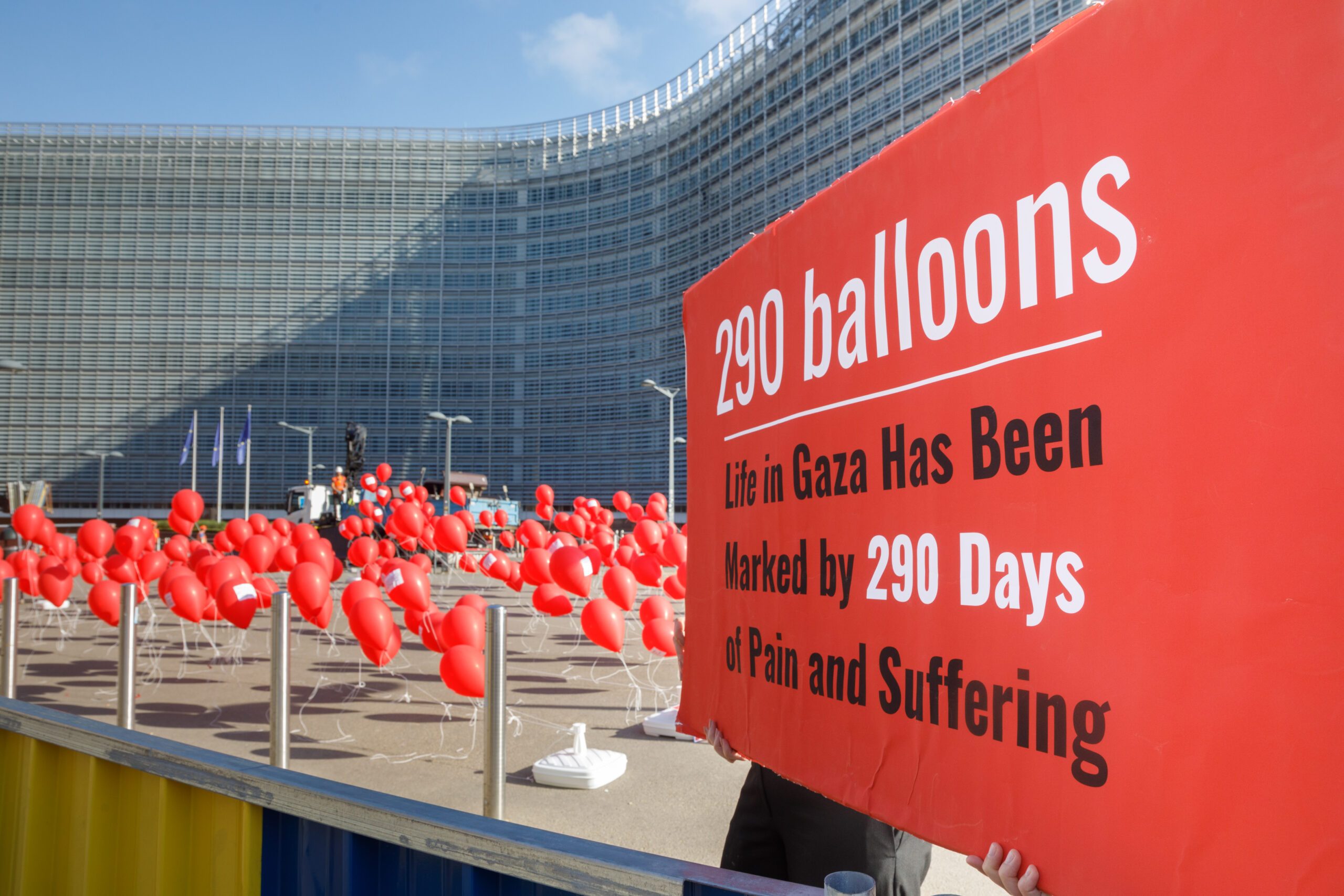NGOs rally at the EU Council: lack of political action prolongs humanitarian catastrophe in Gaza
22 July 2024
Brussels, July 22, 2024 – A powerful display of 290 red balloons, symbolising 290 days of relentless conflict in Gaza, has been installed in front of the European Union (EU) Council and the European Parliament today by a group of non-governmental organisations (NGOs).
The organisations are using the balloons with stark messages to express their dissatisfaction with the EU’s lack of efforts to end the humanitarian catastrophe in Gaza. The group calls on EU leaders to demonstrate decisive leadership and take meaningful action to secure an immediate and definitive ceasefire and bring an end to the conflict, ensure the release of all remaining hostages, and provide much-needed respite for the people of Gaza.
For the past 290 days, Gaza has witnessed horrific events resulting in more than 38,700 civilian fatalities, including more than 14,000 children. Nearly 1,9 million or 90% population has been displaced. More than 360,000 homes have been destroyed or damaged. Gaza is littered with unexploded ordnances, posing an additional threat to the population being displaced due to ongoing bombing and shelling.
Antoine Sépulchre, Managing Director of Handicap International Belgium says: “There are continuous reports about the constant bombing and shelling of Gaza. The Israeli military is launching devastating strikes on hospitals, schools, and refugee camps, even though some of them are designated as “safe zones” by the Israeli military. These areas are densely populated by displaced Palestinians, including women and children seeking refuge. Eyewitnesses have been reporting that some attacks consist of multiple strikes targeting survivors who are trying to escape from their shelters following the initial explosion. Despite their desperate attempts to escape violence, civilians face relentless hostilities, revealing a tragic cycle of displacement without safety or protection. Nowhere is safe in Gaza!”.
For the past 290 days, children have been left without protection and are paying the heaviest price for the ongoing violence. These children face increased risk of violence, exploitation, neglect, and abuse. Those not killed by bullets and bombs are dying because of malnutrition, dehydration, and disease – entirely preventable deaths that sufficient humanitarian access would have prevented. Nearly 90% of all school buildings and every university have been damaged or destroyed, depriving children of education and a sense of normalcy. The constant fear and instability push children’s mental health beyond breaking point, creating a generation scarred by war. The long-term consequences of this violence threaten the future of Gaza, as children, who are meant to be the hope and foundation for a better tomorrow, are being relentlessly victimized by the ongoing conflict.
“The EU must do better. It must be bolder in its diplomatic efforts and resolute in its demands for an immediate, lasting ceasefire and guarantees for the safe, sustained, unimpeded access for aid workers and desperately needed life-saving supplies.”
Niamh Nic Carthaigh, Plan International Head of EU Liaison Office and Senior EU Representative
The war has created massive displacement of the population depending on humanitarian aid that continues to face severe delivery challenges. Blockades and restrictions have severely hindered the flow of essential supplies, including food, medical aid, and other critical resources, further worsening the living conditions for those affected.
Niamh Nic Carthaigh, Plan International Head of EU Liaison Office and Senior EU Representative, says: “For almost ten months the international community has failed to stop this brutal conflict – it is a profound and collective failure. More than 37,000 Palestinians have been killed and months of relentless bombardment continues to decimate the people of Gaza, destroying their homes, schools, hospitals, water supplies and temporary spaces of refuge. The catastrophic psychological impact will haunt children and their caregivers for years, reverberating across generations. The EU must do better. It must be bolder in its diplomatic efforts and resolute in its demands for an immediate, lasting ceasefire and guarantees for the safe, sustained, unimpeded access for aid workers and desperately needed life-saving supplies”.
Despite ongoing calls for a ceasefire for nearly 10 months, this prolonged political inaction has exacerbated the humanitarian crisis, demanding immediate and effective intervention. EU member states must not stand by as the situation deteriorates; immediate and resolute action is required to prevent further suffering and restore stability in the region.


